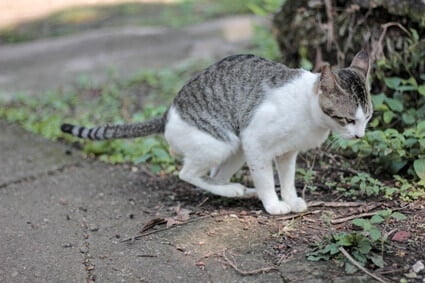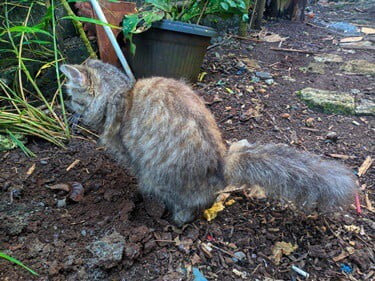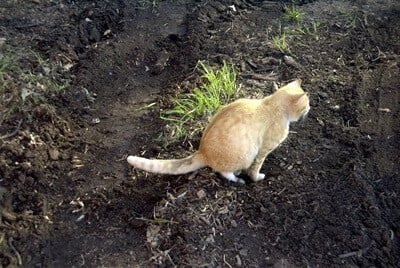Cats know that they need to cover up their poop and urine. This prevents the strong scent from being detected by predators. Cats are also clean animals that dislike being around dirt and filth. So, it comes as a surprise when your older cat stops covering up the waste in its litter box.
Cats stop covering their waste due to arthritis, mobility issues, injuries, diabetes, kidney failure, and urinary tract infections. The discomfort that these medical conditions cause makes covering poop and urine difficult. Older cats may have cognitive issues, so they forget how to hide their waste.
Of course, there are benign explanations. Cats are selective about their litter boxes and may refuse to use them if they’re too small, dirty, or close to something noisy. If your cat has to compete with other pets to use its litter tray, it may refuse to cover its feces. This is a way to mark its territory, flee from an area quickly, or protest to you.
Why Is My Cat Not Covering Its Poop?
Even a stray cat will know that it needs to bury its poop. While not all felines in the animal kingdom partake in this habit, it’s a very common survival tactic.
Burying waste enables cats to avoid:
- Conflict with other felines
- Attracting predators
- Creating mess
If a cat refuses to, it’s a sign of health issues, stress, and rebellion. That’s especially true for older cats, as they’re already well-versed in keeping a tidy litter box. Unlike kittens, your older cat should know the drill.
Litter Box Preferences
Cats can be very particular about their litter boxes. Everything from the size, placement, cleaning frequency, and litter can make a cat stop burying its poop. Older cats especially have preferences and refuse to compromise on them.
Space
For a cat to bury its poop, it needs enough space. A too-small litter box can make it difficult for a cat to move around properly, gather up litter, and spread it evenly. So, ensure that the litter tray is big enough for your cat.
Cleanliness
No matter the size, if a litter box is already too full of poop, the cat is unlikely to bury its waste. At the very least, it won’t cover the feces properly.
Cats want to remain clean, so they’ll be reluctant to dig around in a messy litter tray. Scoop the box daily and change the litter once a week.
Litter Type
The litter type can discourage cats from burying poop. The cat may:
- Have an allergic reaction to the litter
- Be overwhelmed by perfumes in the litter
- Dislike the texture or smell
If you’ve changed the litter type recently and your cat’s behavior changed, switch back again.
Too Much Noise
Cats prefer a quiet, out-of-the-way place to do their business. Move the tray somewhere with few interruptions.
Some cats prefer to be the only one using a specific litter tray. If you have several cats, a good rule is to have 1-2 boxes per cat. At the very least, you can have 1 box per cat, plus 1 extra.
Avoid disturbing your cat while it’s going to the bathroom. Animals are more vulnerable during this time, and they know it. Your cat may stop using its litter box or avoid covering the poop correctly if it knows you’re nearby.
Placing these trays in different rooms can be beneficial.
Stress
Sudden changes can stress older cats. Most will have enjoyed a fixed routine for many years. If you’ve welcomed in a new roommate or shifted around their litter box placement, this could be enough to unsettle them.
Cats may associate places, objects, and locations with stress. A cat that connects negative experiences with a litter box will prefer to go to the toilet and leave. It won’t remain to bury its poop or pee.
To break this association, give the cat a clean litter box and move it into a location that’s:
- Quiet and away from foot traffic
- Inaccessible by other animals, like dogs
- Well alluminated

Territory Marking
Cats don’t maintain fixed territories long-term, but they can be defensive of their favorite spots.
The best way to do this is through scent. According to the Journal of the American Veterinary Medical Association, urine marking is the most common territorial behavior for cats.
A cat that wants to display dominance will leave its feces uncovered. This allows other cats to tell who the cat is, where it is, and if it claims the space. If another cat leaves its feces unmarked in this area, it’s an open challenge. That’s why most cats bury their feces to avoid issuing a challenge.
Your cat may react to stray, feral, or outdoor cats coming near its territory. Seeing another cat by the window can make your cat feel like it needs to mark its territory. This is a behavior seen in even neutered cats. Hopefully, it will go away once your cat feels secure or the challenger moves on.
For multi-cat households, placing litter boxes in various areas enables cats to get along better. If they don’t feel crowded, they won’t feel the need to defend a set amount of space.
Older cats are less likely to territory mark, especially if they never have before, but it happens. If so, stress from sudden changes is usually the culprit.
Cat Suddenly Doesn’t Cover Poop
Not covering poop could signify a health problem associated with aging in senior cats. This includes:
Diabetes
Diabetes causes cats to urinate excessively, discouraging a cat from spending extra time in the litter box.
Discomfort while passing waste can lead to a cat associating that pain with the litter box. It will then try to leave the place as quickly as possible, leaving all waste uncovered.
A cat that uses the litter box more frequently will also use up the litter faster. This can make it difficult to properly distribute the substrate and cover its waste.
Kidney Failure
Issues with the kidneys can make passing urine painful. As with diabetes, this may cause cats to associate the pain with using the litter box.
According to the Journal of Veterinary Internal Medicine, any cat can develop kidney issues, depending on its lifestyle. However, it’s more common among older cats, especially those fed a poor diet in their early years.
Urinary Tract Infections
Urinary tract infections can lead to discomfort and an excessive need to urinate.
That may cause a cat to squat oddly as it tries to pee, which is easier to do so outside the litter box. The cat may also move around, trying to find the right spot to pee, even if it doesn’t physically pass anything.
Injuries
Injuries often cause a cat’s behavior to change in ways we don’t expect. It’s instinctual for cats to hide discomfort and pain. Picking up on little changes in how they act is often how we recognize that something is wrong.
A foot injury, ingrown or broken claw, or sensitive paw pads can make it painful for a cat to dig through its litter and bury its poop. Inspect your cat’s paws for anything usual or sore-looking.
A declawed cat may be physically unable to cover its poop due to pain and physical disability. A softer litter may be good for a cat with sensitive feet. If you’re using crystal litter, try cardboard or a soft clay mix instead.
Older Cat Not Burying Poop
Age brings with it several changes to a cat’s life. If your elderly cat has stopped burying its feces, some problems are isolated to its age group.
Arthritis
Arthritis is common in elderly cats, and it can make moving awkward and painful. Climbing into a litter box may not be as easy as it once was. Likewise, digging up litter to bury feces can be tiring and uncomfortable.
Help your older cat to go to the toilet by making certain changes, including:
- Swapping the litter tray for one with low walls
- Using a softer, lighter litter
- Adding a ramp to the litter tray for easy access
- Moving the tray closer to where the cat spends its time
Arthritis isn’t curable, but the symptoms can be managed.
Cognitive Problems
In their twilight years, cats may develop dementia and lose the ability to sense when and where they go to the bathroom. There is no way to reverse this problem.
To assist a cat with cognitive problems, you can apply the suggested changes. However, it’s unlikely that the cat will bury its poop, no matter what changes you make. Puppy training pads can be used to contain the mess.

Mobility Problems
Mobility problems include joint issues, weakened bones, and muscle degeneration.
Observe your cat when it goes to the bathroom. Does it struggle to move or position itself? Does it stumble or seem weak on one limb? If so, it may be having mobility problems. These could be minor, like a sprain, or more serious, like a degenerative disorder.
Changing the kind of litter box you provide will make it easier to get in and out. However, if the cat can’t dig properly, it won’t be able to bury its feces.
How To Get A Cat To Cover Its Poop
If your cat is experiencing a medical issue, it can’t bury its poop. Instead, you’ll need to take it to a vet for treatment. Once it regains its ability to move, dig, and stay in the litter box as long as it needs to, it should pick up the habit again.
If your cat refuses to cover its poop because of behavioral issues, you can re-train it. Some cats will stop covering their poop as a rebellious act. They are trying to spite a rival cat or scare off another pet with a show of dominance.
Other cats will stop covering poop out of stress and get into the bad habit of leaving it that way. In these scenarios, start by removing the problem:
- If your cat is upset by another cat, separate them or help them bond.
- If your cat feels threatened by a stray cat roaming outside its window, encourage the other cat to leave.
- If the cat is stressed by a change in the home, help it calm down and adjust.
Once that’s resolved, you can apply re-training:
- When the cat has finished using its litter box, check if it has covered the poop.
- If it hasn’t or has only partly covered it, return the cat to the box.
- Using its paw, make it brush litter over the waste.
- Do this each time the cat uses the box.
- Once it covers the poop, reward it with praise or treats.
Cats rarely stop covering their poop for no reason. By narrowing down the cause, you can take steps to correct the problem. If your cat has a long-term health problem, you can make using the litter tray less demanding.

